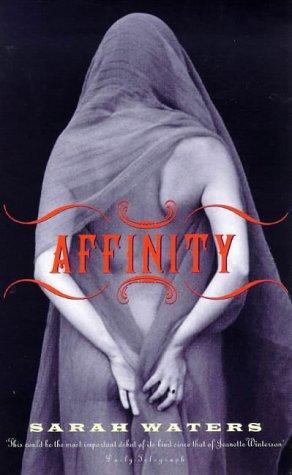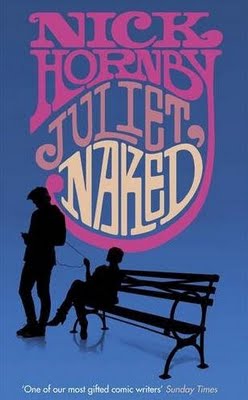Book review Monday: Two okay books by two good authors
I’m in the odd position this week of having read a bunch of books since I last blogged, but no books that I’m super jazzed about. Normally, I read several books at a time and am usually pretty excited by at least one of them. But over the past few weeks, I’ve read a couple of books that were just ‘meh,’ which is disappointing. Now, however, I’ve started a couple of new ones that have me hooked (Stephen King’s The Stand, for one, and Elisabeth Kostova’s The Historian — more on those in the coming weeks). So, today I figure I’ll do two mini reviews of two mediocre-to-decent books I’ve read recently: Juliet Naked, by Nick Hornby, and Affinity, by Sarah Waters. The funny thing is, these are both authors whose other books I’ve enjoyed greatly. But even the greats have their off days, I suppose.
Let’s start with Affinity. I read Sarah Waters’ 2009 ghost story The Little Stranger a few months ago and really enjoyed it, so I figured her second novel, Affinity, would also be a good bet. Most of Waters’ books (with the exception of The Little Stranger) take place in the Victorian era, and most involve lesbian characters. Affinity focuses on the world of Victorian spiritualism (seances and dark meetings and so on). The plot revolves around two women: Selina Dawes, a spirit medium, and Margaret Prior, an upper-class lady who frequently visits a women’s prison. Miss Prior’s reasons for visiting the women’s prison are never really fleshed out, but it has something to do with wanting to have a pastime and get out of the house, since she once tried to kill herself, she’s still mourning her father’s death, and is generally Not Well. While touring the prison, Miss Prior meets Dawes, who’s serving time for a mishap that occurred during one of her seances that resulted in the death of her patron, an older lady, and the injury of a young girl. Miss Prior becomes fascinated with Dawes and the two develop an “affinity” with each other. Prior becomes convinced that Dawes is her spiritual and romantic other half and ends up going to great lengths to help her, ultimately to Miss Prior’s own detriment.
Without giving anything away, I can tell you that there is a twist in the book, and I kinda saw it coming from a mile away. I didn’t anticipate the precise twist, but its general shape was not a huge surprise. When I finished the book, I was left with the feeling that Waters had pulled a bit of a cheap party trick on her readers, much like a Victorian spirit medium leading a seance. The plot buildup of the book was much too slow to justify the weakness of the final twist. I wasn’t impressed. Maybe from now on I’ll stick with Waters’ books that have actually been shortlisted for the Man Booker Prize (The Little Stranger, The Night Watch, Fingersmith).
Now, moving on to Nick Hornby’s Juliet Naked. First, I should point out that I am a big Nick Hornby fan. Some of his books have made truly lasting impressions on me (About a Boy, A Long Way Down, How to Be Good, Slam), and I love his writing style. My friend Yohanca and I once had a discussion about why we like Nick Hornby and our conclusion was that his writing feels comfortable and familiar, like you’re wrapped in a warm blanket, while still being lively and witty. His writing, in other words, is like a Slanket. And how can you go wrong with a Slanket? I don’t know, but Juliet Naked did not totally work for me. The story is about an English couple, Annie and Duncan, who are not miserable, necessarily, but who aren’t happy, either. They’ve been together for a long time and Annie has become bored and annoyed with Duncan’s nearly all-consuming obsession with an American musician, the fictional Tucker Crowe. Crowe disappeared suddenly off the music scene twenty years earlier and is believed to be a hermit, living off the grid in rural Pennsylvania, but he still has a rabid fan-base online, mostly made up of nerdy, socially challenged men like Duncan. When Duncan gets his hands on a pared down/acoustic version of one of Crowe’s most famous albums, Juliet, Annie and Duncan are brought into sharp conflict over their disparate reactions to it (Duncan loves it; Annie thinks it’s crap). Annie writes a piece criticizing the album (the titular “Juliet Naked”) and posts it on the Tucker Crowe fan site where Duncan spends most of his free time, and, to her shock, Tucker Crowe responds. Thus, Annie and Tucker Crowe begin a strange friendship that morphs into a cautious romantic relationship when Tucker comes to England from America.
There are parts of the book that did work for me. For one thing, I think Hornby captured perfectly the online fan milieu in which many people operate, the separate and apart internet communities that people live their lives in, and the rules and customs and social hierarchies that spring up in those communities. I also liked the character of Annie and thought that both she and Duncan were well developed. Some of the descriptions of Annie’s unhappiness, and her worry that she wasted many years of her life with a man who was wrong for her, are pitch perfect. For instance, when Annie starts corresponding with Tucker, she tells him she’s worried she’s squandered fifteen years of her life with Duncan. He responds:
“First of all, you have to get that number down. Make a list of all the good books you’ve read, movies you’ve seen, conversations you’ve had and so on, and give all these things a temporal value. With a little bit of creative accounting, you should be able to reduce it to ten. I’ve got mine down to about that now, although I’ve cheated here and there — I included the whole of my son Jackson’s life, for example, and he’s been at school and asleep for a lot of the time-wasting years.
I’d like to say that anything that comes in around a decade you can write off for tax purposes, but that isn’t actually the way I feel. I’m still pretty sick about what I’ve lost, but I only admit it to myself late at night, which is probably why I’m not hte best sleeper. What can I tell you? If it really was wasted time — and I’d need to examine your diary pretty carefully before I could confirm that for you — then I have some bad news: it’s gone. You can maybe add a little onto the other end by giving up drugs, or cigarettes, or by going to the gym a lot, but my guess is that those years after the age of eighty aren’t as much fun as they’re cracked up to be.”
I love that.
For all that enjoyed about the book, however, I was left a bit cold by Hornby’s long descriptions of fictional pieces of music and the debates that the characters had over said pieces of imaginary music. I know from reading High Fidelity that Hornby takes his music seriously, but in my opinion, music commentary within a novel only works if the music is something one can actually listen to. Also, as a little nitpicky complaint, I found some of Tucker’s dialogue and speech patterns to be unmistakably British, even though the character is supposed to be American. You’d think Hornby could afford a great American editor to take a look-see and make sure the American characters aren’t saying “pip pip cheerio,” or whatever. Oh, well.
Neither of these books were bad, but neither were slam-dunks, either. If you’re looking to read Sarah Waters, check out The Little Stranger. And if you want a good introduction to Hornby, start with How to Be Good and go from there.



1 Comment-
Pingback: Cape Town, for the last time | Stephanie Early Green